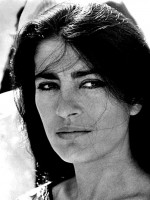Mikis Theodorakis is a Actor and Sound Grec born on 29 july 1925 at Chios (Grece)

Michael "Mikis" Theodorakis (Greek: Μιχαήλ (Μίκης) Θεοδωράκης, [ˈmicis θeoðoˈracis]; born 29 July 1925) is a Greek songwriter of over 1000 songs and composer. He scored for the films Zorba the Greek (1964), Z (1969), and Serpico (1973). He is viewed as Greece's best-known living composer.
Politically, he identified with the left until the late 1980s; in 1989 he ran as an independent candidate within the centre-right New Democracy party in order for the country to come out of the political crisis that had been created due to the numerous scandals of the government of Andreas Papandreou and helped to establish a large coalition between conservatives, socialists and leftists. In 1990 he was elected to the parliament (as in 1964 and 1981), became a government minister under Constantine Mitsotakis, and fought against drugs and terrorism and for culture, education and better relations between Greece and Turkey. He continues to speak out in favor of left-liberal causes, Greek-Turkish-Cypriot relations, and against the War in Iraq. He has consistently opposed oppressive regimes and was a key voice against the Greek junta 1967-1974, which imprisoned him.
Mikis Theodorakis was born on the Greek island of Chios and spent his childhood years in different provincial Greek cities such as Mytilene, Cephallonia, Patras, Pyrgos, and Tripoli. His father, a lawyer and a civil servant, was from the small village of Kato Galatas, in Crete and his mother, Aspasia Poulakis, was from an ethnically Greek family in Çeşme, in what is today Turkey. He was raised with Greek folk music and was influenced by Byzantine liturgy; as a child he had already talked about becoming a composer.
Theodorakis's fascination with music began in early childhood; he taught himself to write his first songs without access to musical instruments. In Patras and Pyrgos he took his first music lessons, and in Tripoli, Peloponnese, he gave his first concert at the age of seventeen.
He went to Athens in 1943, and became a member of a Reserve Unit of ELAS, and led a troop in the fight against the British and the Greek right in the Dekemvriana.
During the Greek Civil War he was arrested, sent into exile on the island of Icaria and then deported to the island of Makronisos, where he was tortured and twice buried alive.
During the periods when he was not obliged to hide, not exiled or jailed, he studied from 1943 to 1950 at the Athens Conservatoire under Filoktitis Economidis. In 1950, he finished his studies and took his last two exams "with flying colours". He went to Crete, where he became the "head of the Chania Music School" and founded his first orchestra. At this time he ended what he has called the first period of his musical writing.
Studies in Paris
In 1954 he travelled with his young wife Myrto Altinoglou to Paris where he entered the Conservatory and studied musical analysis under Olivier Messiaen and conducting under Eugene Bigot. His time in Paris, 1954–1959, was his second period of musical writing.
His symphonic works: a Piano concerto, his first suite, his first symphony, and his scores for the ballet: Greek Carnival, Le Feu aux Poudres, Les Amants de Teruel, received international acclaim. In 1957, he won the Gold Medal in the Moscow Music Festival; President of the Jury was Dmitri Shostakovitch. In 1959, after the successful performances of Theodorakis's ballet Antigone at Covent Garden in London, the French composer Darius Milhaud proposed him for the American Copley Music Prize - an award of the "William and Noma Copley Foundation", which later changed its name to "Cassandra Foundation" - as the "Best European Composer of the Year". His first international scores for the film Ill Met by Moonlight and Luna de Miel, directors: Michael Powell and Emeric Pressburger, were also very successful: The Honeymoon title song became part of the repertoire of The Beatles.
Notable works up to 1960
Chamber Music: Four String Quartets; Trio four piano, violin, cello; Little Suite for piano; Sonatina for piano; Sonatinas No.1 and No.2 for violin and piano;
Symphonic music: Assi-Gonia (symphonic movement; Piano Concerto "Helicon"; Symphony No.1 (Proti Simfonia); Suites n° 1, 2 et 3 for orchestre; La Vie et la Mort / Live and Death (for voice and strings); Œdipus Tyrannos (for strings; later for quartet and symphony orchestra); Piano Concerto;
Ballets: Greek Carnival; Le Feu aux Poudres; Les Amants de Teruel; Antigone;
Filmscores: The Barefoot Battalion (Greg Tallas); Ill Met by Moonlight and Honeymoon (Powell and Pressburger); Faces in the Dark (David Eady).
Back to Greek roots
In 1960, Theodorakis returned to Greece and his roots in genuine Greek music: With his song cycle Epitaphios he started the third period of his composing and contributed to a cultural revolution in his country. His most significant and influential works are based Greek and world poetry – Epiphania (Giorgos Seferis), Little Kyklades (Odysseas Elytis), Axion Esti (Odysseas Elytis), Mauthausen (Iakovos Kambanellis), Romiossini (Yannis Ritsos), and Romancero Gitano (Federico García Lorca) – he attempted to give back to Greek music a dignity which in his perception it had lost. He developed his concept of "metasymphonic music" (symphonic compositions that go beyond the "classical" status and mix symphonic elements with popular songs, Western symphonic orchestra and Greek popular instruments).
He founded the Little Orchestra of Athens and the Musical Society of Piraeus, gave many, many concerts all around Greece and abroad... and he naturally became involved in the politics of his home country. After the assassination of Gregoris Lambrakis in May 1963 he founded the Lambrakis Democratic Youth ("Lambrakidès") and was elected its president. Under Theodorakis's impetus, it started a vast cultural renaissance movement and became the greatest political organisation in Greece with more than 50.000 members. Following the 1964 elections, Theodorakis became a member of the Greek Parliament, associated with the left-wing party EDA. Because of his political ideas, the composer was black-listed by the cultural establishment; at the time of his biggest artistic glory, a large number of his songs were censored-before-studio or were not allowed on the radio stations.
During 1964, he wrote the music for the Michael Cacoyiannis film Zorba the Greek, whose main theme, since then, exists as a trademark for Greece. It is also known as 'Syrtaki dance'; inspired from old Cretan traditional dances.
Main works of this period
Song cycles: Epitaphios (Yannis Ritsos); Archipelagos (Songs of the Islands), Politia A & B (Songs of the City), Epiphania (Giorgos Seferis, Nobel Prize 1963), Mikres Kyklades (Odysseas Elytis), Chrysoprasino Fyllo (Golden-green leaf), Mauthausen (Iakovos Kambanellis), Romiossini (Yannis Ritsos), Thalassina Feggaria (Moons of the Sea)
Oratorio: To Axion Esti (Odysseas Elytis, Nobel Prize 1979), cf. Theodorakis on Axion Esti
Music for the Stage: The Hostage (Brendan Behan); Ballad of the Dead Brother (Theodorakis); Omorphi Poli (Beautiful City); Maghiki Poli (Magical City); I Gitonia ton Angelon(The Angels' Quarter, Iakovos Kambanellis)
Film scores: Phaedra (Jules Dassin), The Lovers of Teruel (Raymond Rouleau), Five Miles to Midnight (Anatole Litvak), Electra and Zorba the Greek (Michalis Cacoyannis), To Nisi tis Afroditis (Harilaos Papadopoulos)
During the dictatorship
On 21 April 1967 a right wing junta (the Regime of the Colonels) took power in a putsch. Theodorakis went underground and founded the "Patriotic Front" (PAM). On 1 June, the Colonels published "Army decree No 13", which banned playing, and even listening to his music. Theodorakis himself was arrested on 21 August, and jailed for five months. Following his release end of January 1968, he was banished in August to Zatouna with his wife Myrto and their two children, Margarita and Yorgos. Later he was interned in the concentration camp of Oropos. An international solidarity movement, headed by such personalities as Dmitri Shostakovich, Leonard Bernstein, Arthur Miller, and Harry Belafonte demanded to get Theodorakis freed. On request of the French politician Jean-Jacques Servan-Schreiber, Theodorakis was allowed to go into exile to Paris on 13 April 1970. Theodorakis's flight left very secretly from an Onassis owned private airport outside Athens. Theodorakis arrived at Le Bourget Airport where he met Costa Gavras, Melina Mercouri and Jules Dassin. Theodorakis was immediately hospitalized because he suffered from lung tuberculosis.
Myrto Theodorakis, Mikis's wife and two children joined him a week later in France. They arrived from Greece to France via Italy on a boat.
Main works under the dictatorship
Song cycles: Ta Laïka (The Popular Songs, Manos Elefteriou); O Ilios ke o Chronos (Sun and Time, Theodorakis); Songs for Andreas (Theodorakis); Arcadies I-X; Nichta Thanatou (Nights of Death, Manos Elefteriou);
Oratorios: Ephiphania Averoff Giorgos Seferis, State of Siege (Marina = Rena Hadjidakis), March of the Spirit (Angelos Sikelianos), Raven (Giorgos Seferis, after Edgar Allan Poe);
Film score: Z (Costa-Gavras).
Resistance in exile
While in exile, Theodorakis fought during four years for the overthrow of the colonels. He started his world tours and gave thousands of concerts on all continents as part of his struggle for the restoration of democracy in Greece.
He met Pablo Neruda and Salvador Allende and promised them to compose his version of Neruda's Canto General. He was received by Gamal Abdel Nasser and Tito, Yigal Allon and Yasser Arafat, while François Mitterrand, Olof Palme and Willy Brandt became his friends. For millions of people, Theodorakis was the symbol of resistance against the Greek dictatorship.
Main works written in exile
1. Song cycles: 18 lianotragouda tis pikris patridas (18 Short Songs of the Bitter Land, Yiannis Ritsos), Ballades (Manolis Anagnostakis), Tis exorias (Songs of the Exile)
2. Oratorio: Canto General (Pablo Neruda)
3. Film scores: The Trojan Women (M. Cacoyannis); State of Siege (Costa-Gavras); Serpico (Sidney Lumet)
Return to Greece
After the fall of the Colonels, Mikis Theodorakis returned to Greece on 24 July 1974 to continue his work and his concert tours, both in Greece and abroad. At the same time he participated in public affairs. In 1978, through his article For a United Left Wing, he had "stirred up the Greek political life. His proposal for the unification of the three parties of the former United Left – which had grown out of the National Liberation Front (N.L.F.) – had been accepted by the Greek Communist Party which later proposed him as the candidate for mayor of Athens during the 1978 elections." (Andreas Brandes) He was later elected several times to the Greek Parliament (1981–1986 and 1989–1993) and for two years, from 1990 to 1992, he was a minister in the government of Constantine Mitsotakis. After his resignation as a member of Greek parliament, he was appointed General Musical Director of the Choir and the two Orchestras of the Hellenic State Radio (ERT), which he reorganised and with which he undertook successful concert tours abroad.
He is committed to heightening international awareness of human rights, of environmental issues, and of the need for peace and for this reason he initiated, together with the Turkish author, musician, singer, and filmmaker Zülfü Livaneli the Greek–Turkish Friendship Society.
From 1981, Theodorakis had started the fourth period of his musical writing, during which he returned to the symphonic music, while still going on to compose song-cycles. His most significant works written in these years are his Second, Third, Fourth and Seventh Symphony, most of them being first performed in the former German Democratic Republic between 1982 and 1989. It was during this period that he received the Lenin Peace Prize. He composed his first opera Kostas Kariotakis (The Metamorphoses of Dionysus) and the ballet Zorba the Greek, premièred in the Arena of Verona during the Festival Verona 1988. During this period, he also wrote the five volumes of his autobiography: The Ways of the Archangel (Οι δρόμοι του αρχάγγελου).
In 1989, he started the fifth period, the last, of his musical writing: He composed three operas (lyric tragedies) Medea, first performed in Bilbao (1 October 1991), Elektra, first performed in Luxembourg (2 May 1995) and Antigone, first performed in Athens' Megaron Moussikis (7 October 1999). This trilogy was complemented by his last opera Lysistrata, first performed in Athens (14 April 2002): a call for peace... With his operas, and with his song cycles from 1974 to 2006, Theodorakis ushered in the period of his Lyrical Life.
For a period of 10 years, Alexia Vassiliou teamed up with Mikis Theodorakis and his Popular Orchestra. During that time, and as a tribute to Theodorakis’s body of work, Vassiliou recorded a double album showcasing some of the composer’s most consummate musical creations, and in 1998, Sony BMG released the album entitled Alexia–Mikis Theodorakis.
Theodorakis is Doctor honoris causa of several universities, including Montreal, Thessaloniki, and Crete, and was nominated for the Nobel Prize for Peace in 2000.
Now he lives in retirement, reading, writing, publishing arrangements of his scores, texts about culture and politics. On occasions he still takes position: in 1999, opposing NATO's Kosovo war and in 2003 against the Iraq War. In 2005, he was awarded the Sorano Friendship and Peace Award, the Russian International St.-Andrew-the-First-Called Prize, the insignia of Grand Officer of the Order of Merit of Luxembourg, and the IMC UNESCO International Music Prize, while already in 2002 he was honoured in Bonn with the Erich Wolfgang Korngold Prize for film music at the International Film Music Biennial in Bonn (cf also: Homepage of the Art and Exhibition Hall Bonn). In 2007, he received a Lifetime Achievement Award at the distribution of the World Soundtrack Awards in Ghent.
A final set of songs entitled: Odysseia was composed by utilizing poetry written by Costas Kartelias for lyrics. In 2009 he composed a Rhapsody for Strings (Mezzo-Soprano or Baryton ad lib.)Created on 30 January 2013, Theodorakis achieved the distinction of producing one of the largest works by any composer of any time.
Main works after 1974
Song cycles: Ta Lyrika; Dionysos; Phaedra; Beatrice in Zero Street; Radar; Chairetismoi (Greetings); Mia Thalassa (A Sea Full of Music); Os archaios Anemos (Like an Ancient Wind); Lyrikotera (The More-Than-Lyric Songs); Lyrikotata (The Most Lyric Songs); Erimia (Solitude); Odysseia;
Music for the Stage: Orestia (dir.: Spyros Evangelatos); Antigone (dir.: Minos Volanakis); Medea (dir.: Spyros Evangelatos)
Film scores: Iphigenia (M. Cacoyannis), The Man with the Carnation (Nikos Tzimas)
Oratorios: Liturgia 2; Missa Greca (Thia Liturgia); Requiem;
Symphonic music and cantatas: Symphonies no 2, 3, 4, 7; According to the Sadducees; Canto Olympico; Guitar Rhapsody; Cello Rhapsody; Trumpet Rhapsody; Rhysody for Strings (Mezzo-Sopran or Baryton ad lib.)
Operas: "The Metamorphosis of the Dionysus" (Kostas Karyotakis); Medea; Elektra; Antigone; Lysistrata.
 (1964)
(1964)
(Original Music Composer)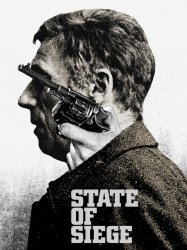 (1972)
(1972)
(Original Music Composer) (1969)
(1969)
(Original Music Composer) (1962)
(1962)
(Original Music Composer)
Source : Wikidata
Mikis Theodorakis

- Infos
- Photos
- Best films
- Family
- Characters
- Awards
Nationality Grece
Birth 29 july 1925 at Chios (Grece)
Death 2 september 2021 (at 96 years)
Awards Commandeur de la Légion d'honneur
Birth 29 july 1925 at Chios (Grece)
Death 2 september 2021 (at 96 years)
Awards Commandeur de la Légion d'honneur
Politically, he identified with the left until the late 1980s; in 1989 he ran as an independent candidate within the centre-right New Democracy party in order for the country to come out of the political crisis that had been created due to the numerous scandals of the government of Andreas Papandreou and helped to establish a large coalition between conservatives, socialists and leftists. In 1990 he was elected to the parliament (as in 1964 and 1981), became a government minister under Constantine Mitsotakis, and fought against drugs and terrorism and for culture, education and better relations between Greece and Turkey. He continues to speak out in favor of left-liberal causes, Greek-Turkish-Cypriot relations, and against the War in Iraq. He has consistently opposed oppressive regimes and was a key voice against the Greek junta 1967-1974, which imprisoned him.
Biography
Early yearsMikis Theodorakis was born on the Greek island of Chios and spent his childhood years in different provincial Greek cities such as Mytilene, Cephallonia, Patras, Pyrgos, and Tripoli. His father, a lawyer and a civil servant, was from the small village of Kato Galatas, in Crete and his mother, Aspasia Poulakis, was from an ethnically Greek family in Çeşme, in what is today Turkey. He was raised with Greek folk music and was influenced by Byzantine liturgy; as a child he had already talked about becoming a composer.
Theodorakis's fascination with music began in early childhood; he taught himself to write his first songs without access to musical instruments. In Patras and Pyrgos he took his first music lessons, and in Tripoli, Peloponnese, he gave his first concert at the age of seventeen.
He went to Athens in 1943, and became a member of a Reserve Unit of ELAS, and led a troop in the fight against the British and the Greek right in the Dekemvriana.
During the Greek Civil War he was arrested, sent into exile on the island of Icaria and then deported to the island of Makronisos, where he was tortured and twice buried alive.
During the periods when he was not obliged to hide, not exiled or jailed, he studied from 1943 to 1950 at the Athens Conservatoire under Filoktitis Economidis. In 1950, he finished his studies and took his last two exams "with flying colours". He went to Crete, where he became the "head of the Chania Music School" and founded his first orchestra. At this time he ended what he has called the first period of his musical writing.
Studies in Paris
In 1954 he travelled with his young wife Myrto Altinoglou to Paris where he entered the Conservatory and studied musical analysis under Olivier Messiaen and conducting under Eugene Bigot. His time in Paris, 1954–1959, was his second period of musical writing.
His symphonic works: a Piano concerto, his first suite, his first symphony, and his scores for the ballet: Greek Carnival, Le Feu aux Poudres, Les Amants de Teruel, received international acclaim. In 1957, he won the Gold Medal in the Moscow Music Festival; President of the Jury was Dmitri Shostakovitch. In 1959, after the successful performances of Theodorakis's ballet Antigone at Covent Garden in London, the French composer Darius Milhaud proposed him for the American Copley Music Prize - an award of the "William and Noma Copley Foundation", which later changed its name to "Cassandra Foundation" - as the "Best European Composer of the Year". His first international scores for the film Ill Met by Moonlight and Luna de Miel, directors: Michael Powell and Emeric Pressburger, were also very successful: The Honeymoon title song became part of the repertoire of The Beatles.
Notable works up to 1960
Chamber Music: Four String Quartets; Trio four piano, violin, cello; Little Suite for piano; Sonatina for piano; Sonatinas No.1 and No.2 for violin and piano;
Symphonic music: Assi-Gonia (symphonic movement; Piano Concerto "Helicon"; Symphony No.1 (Proti Simfonia); Suites n° 1, 2 et 3 for orchestre; La Vie et la Mort / Live and Death (for voice and strings); Œdipus Tyrannos (for strings; later for quartet and symphony orchestra); Piano Concerto;
Ballets: Greek Carnival; Le Feu aux Poudres; Les Amants de Teruel; Antigone;
Filmscores: The Barefoot Battalion (Greg Tallas); Ill Met by Moonlight and Honeymoon (Powell and Pressburger); Faces in the Dark (David Eady).
Back to Greek roots
In 1960, Theodorakis returned to Greece and his roots in genuine Greek music: With his song cycle Epitaphios he started the third period of his composing and contributed to a cultural revolution in his country. His most significant and influential works are based Greek and world poetry – Epiphania (Giorgos Seferis), Little Kyklades (Odysseas Elytis), Axion Esti (Odysseas Elytis), Mauthausen (Iakovos Kambanellis), Romiossini (Yannis Ritsos), and Romancero Gitano (Federico García Lorca) – he attempted to give back to Greek music a dignity which in his perception it had lost. He developed his concept of "metasymphonic music" (symphonic compositions that go beyond the "classical" status and mix symphonic elements with popular songs, Western symphonic orchestra and Greek popular instruments).
He founded the Little Orchestra of Athens and the Musical Society of Piraeus, gave many, many concerts all around Greece and abroad... and he naturally became involved in the politics of his home country. After the assassination of Gregoris Lambrakis in May 1963 he founded the Lambrakis Democratic Youth ("Lambrakidès") and was elected its president. Under Theodorakis's impetus, it started a vast cultural renaissance movement and became the greatest political organisation in Greece with more than 50.000 members. Following the 1964 elections, Theodorakis became a member of the Greek Parliament, associated with the left-wing party EDA. Because of his political ideas, the composer was black-listed by the cultural establishment; at the time of his biggest artistic glory, a large number of his songs were censored-before-studio or were not allowed on the radio stations.
During 1964, he wrote the music for the Michael Cacoyiannis film Zorba the Greek, whose main theme, since then, exists as a trademark for Greece. It is also known as 'Syrtaki dance'; inspired from old Cretan traditional dances.
Main works of this period
Song cycles: Epitaphios (Yannis Ritsos); Archipelagos (Songs of the Islands), Politia A & B (Songs of the City), Epiphania (Giorgos Seferis, Nobel Prize 1963), Mikres Kyklades (Odysseas Elytis), Chrysoprasino Fyllo (Golden-green leaf), Mauthausen (Iakovos Kambanellis), Romiossini (Yannis Ritsos), Thalassina Feggaria (Moons of the Sea)
Oratorio: To Axion Esti (Odysseas Elytis, Nobel Prize 1979), cf. Theodorakis on Axion Esti
Music for the Stage: The Hostage (Brendan Behan); Ballad of the Dead Brother (Theodorakis); Omorphi Poli (Beautiful City); Maghiki Poli (Magical City); I Gitonia ton Angelon(The Angels' Quarter, Iakovos Kambanellis)
Film scores: Phaedra (Jules Dassin), The Lovers of Teruel (Raymond Rouleau), Five Miles to Midnight (Anatole Litvak), Electra and Zorba the Greek (Michalis Cacoyannis), To Nisi tis Afroditis (Harilaos Papadopoulos)
During the dictatorship
On 21 April 1967 a right wing junta (the Regime of the Colonels) took power in a putsch. Theodorakis went underground and founded the "Patriotic Front" (PAM). On 1 June, the Colonels published "Army decree No 13", which banned playing, and even listening to his music. Theodorakis himself was arrested on 21 August, and jailed for five months. Following his release end of January 1968, he was banished in August to Zatouna with his wife Myrto and their two children, Margarita and Yorgos. Later he was interned in the concentration camp of Oropos. An international solidarity movement, headed by such personalities as Dmitri Shostakovich, Leonard Bernstein, Arthur Miller, and Harry Belafonte demanded to get Theodorakis freed. On request of the French politician Jean-Jacques Servan-Schreiber, Theodorakis was allowed to go into exile to Paris on 13 April 1970. Theodorakis's flight left very secretly from an Onassis owned private airport outside Athens. Theodorakis arrived at Le Bourget Airport where he met Costa Gavras, Melina Mercouri and Jules Dassin. Theodorakis was immediately hospitalized because he suffered from lung tuberculosis.
Myrto Theodorakis, Mikis's wife and two children joined him a week later in France. They arrived from Greece to France via Italy on a boat.
Main works under the dictatorship
Song cycles: Ta Laïka (The Popular Songs, Manos Elefteriou); O Ilios ke o Chronos (Sun and Time, Theodorakis); Songs for Andreas (Theodorakis); Arcadies I-X; Nichta Thanatou (Nights of Death, Manos Elefteriou);
Oratorios: Ephiphania Averoff Giorgos Seferis, State of Siege (Marina = Rena Hadjidakis), March of the Spirit (Angelos Sikelianos), Raven (Giorgos Seferis, after Edgar Allan Poe);
Film score: Z (Costa-Gavras).
Resistance in exile
While in exile, Theodorakis fought during four years for the overthrow of the colonels. He started his world tours and gave thousands of concerts on all continents as part of his struggle for the restoration of democracy in Greece.
He met Pablo Neruda and Salvador Allende and promised them to compose his version of Neruda's Canto General. He was received by Gamal Abdel Nasser and Tito, Yigal Allon and Yasser Arafat, while François Mitterrand, Olof Palme and Willy Brandt became his friends. For millions of people, Theodorakis was the symbol of resistance against the Greek dictatorship.
Main works written in exile
1. Song cycles: 18 lianotragouda tis pikris patridas (18 Short Songs of the Bitter Land, Yiannis Ritsos), Ballades (Manolis Anagnostakis), Tis exorias (Songs of the Exile)
2. Oratorio: Canto General (Pablo Neruda)
3. Film scores: The Trojan Women (M. Cacoyannis); State of Siege (Costa-Gavras); Serpico (Sidney Lumet)
Return to Greece
After the fall of the Colonels, Mikis Theodorakis returned to Greece on 24 July 1974 to continue his work and his concert tours, both in Greece and abroad. At the same time he participated in public affairs. In 1978, through his article For a United Left Wing, he had "stirred up the Greek political life. His proposal for the unification of the three parties of the former United Left – which had grown out of the National Liberation Front (N.L.F.) – had been accepted by the Greek Communist Party which later proposed him as the candidate for mayor of Athens during the 1978 elections." (Andreas Brandes) He was later elected several times to the Greek Parliament (1981–1986 and 1989–1993) and for two years, from 1990 to 1992, he was a minister in the government of Constantine Mitsotakis. After his resignation as a member of Greek parliament, he was appointed General Musical Director of the Choir and the two Orchestras of the Hellenic State Radio (ERT), which he reorganised and with which he undertook successful concert tours abroad.
He is committed to heightening international awareness of human rights, of environmental issues, and of the need for peace and for this reason he initiated, together with the Turkish author, musician, singer, and filmmaker Zülfü Livaneli the Greek–Turkish Friendship Society.
From 1981, Theodorakis had started the fourth period of his musical writing, during which he returned to the symphonic music, while still going on to compose song-cycles. His most significant works written in these years are his Second, Third, Fourth and Seventh Symphony, most of them being first performed in the former German Democratic Republic between 1982 and 1989. It was during this period that he received the Lenin Peace Prize. He composed his first opera Kostas Kariotakis (The Metamorphoses of Dionysus) and the ballet Zorba the Greek, premièred in the Arena of Verona during the Festival Verona 1988. During this period, he also wrote the five volumes of his autobiography: The Ways of the Archangel (Οι δρόμοι του αρχάγγελου).
In 1989, he started the fifth period, the last, of his musical writing: He composed three operas (lyric tragedies) Medea, first performed in Bilbao (1 October 1991), Elektra, first performed in Luxembourg (2 May 1995) and Antigone, first performed in Athens' Megaron Moussikis (7 October 1999). This trilogy was complemented by his last opera Lysistrata, first performed in Athens (14 April 2002): a call for peace... With his operas, and with his song cycles from 1974 to 2006, Theodorakis ushered in the period of his Lyrical Life.
For a period of 10 years, Alexia Vassiliou teamed up with Mikis Theodorakis and his Popular Orchestra. During that time, and as a tribute to Theodorakis’s body of work, Vassiliou recorded a double album showcasing some of the composer’s most consummate musical creations, and in 1998, Sony BMG released the album entitled Alexia–Mikis Theodorakis.
Theodorakis is Doctor honoris causa of several universities, including Montreal, Thessaloniki, and Crete, and was nominated for the Nobel Prize for Peace in 2000.
Now he lives in retirement, reading, writing, publishing arrangements of his scores, texts about culture and politics. On occasions he still takes position: in 1999, opposing NATO's Kosovo war and in 2003 against the Iraq War. In 2005, he was awarded the Sorano Friendship and Peace Award, the Russian International St.-Andrew-the-First-Called Prize, the insignia of Grand Officer of the Order of Merit of Luxembourg, and the IMC UNESCO International Music Prize, while already in 2002 he was honoured in Bonn with the Erich Wolfgang Korngold Prize for film music at the International Film Music Biennial in Bonn (cf also: Homepage of the Art and Exhibition Hall Bonn). In 2007, he received a Lifetime Achievement Award at the distribution of the World Soundtrack Awards in Ghent.
A final set of songs entitled: Odysseia was composed by utilizing poetry written by Costas Kartelias for lyrics. In 2009 he composed a Rhapsody for Strings (Mezzo-Soprano or Baryton ad lib.)Created on 30 January 2013, Theodorakis achieved the distinction of producing one of the largest works by any composer of any time.
Main works after 1974
Song cycles: Ta Lyrika; Dionysos; Phaedra; Beatrice in Zero Street; Radar; Chairetismoi (Greetings); Mia Thalassa (A Sea Full of Music); Os archaios Anemos (Like an Ancient Wind); Lyrikotera (The More-Than-Lyric Songs); Lyrikotata (The Most Lyric Songs); Erimia (Solitude); Odysseia;
Music for the Stage: Orestia (dir.: Spyros Evangelatos); Antigone (dir.: Minos Volanakis); Medea (dir.: Spyros Evangelatos)
Film scores: Iphigenia (M. Cacoyannis), The Man with the Carnation (Nikos Tzimas)
Oratorios: Liturgia 2; Missa Greca (Thia Liturgia); Requiem;
Symphonic music and cantatas: Symphonies no 2, 3, 4, 7; According to the Sadducees; Canto Olympico; Guitar Rhapsody; Cello Rhapsody; Trumpet Rhapsody; Rhysody for Strings (Mezzo-Sopran or Baryton ad lib.)
Operas: "The Metamorphosis of the Dionysus" (Kostas Karyotakis); Medea; Elektra; Antigone; Lysistrata.
Best films
 (1964)
(1964)(Original Music Composer)
 (1972)
(1972)(Original Music Composer)
 (1969)
(1969)(Original Music Composer)
 (1962)
(1962)(Original Music Composer)
Usually with
Filmography of Mikis Theodorakis (28 films)
Actor
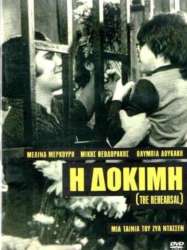
The Rehearsal (1974)
, 1h32Directed by Jules Dassin
Genres Drama, Documentary, Historical
Actors Jules Dassin, Olympia Dukakis, Laurence Olivier, Stathis Giallelis, Lillian Hellman, Melina Mercouri
Rating68%





Sound
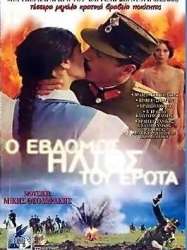
The Seventh Sun of Love (2001)
, 2h4Genres Drama, Romance
Roles Music
Rating66%





The story occurs during Asia Minor Campaign. Aglaia, a young woman of the Greek countryside, is placed as a servant girl in a rich household of an army officer. There, she becomes the objects of desire in the people surround her, the army officer, his wife and servant soldier of the officer. The political events of this turbulent period affect and determine the life of the protagonists.

Genres Drama, Comedy, Romantic comedy
Actors Lakis Lazopoulos, Zoe Carides, John Bluthal, Ron Haddrick, Noni Ioannidou, Tasso Kavadia
Roles Original Music Composer
Rating56%





 , 43minutes
, 43minutesDirected by Theo Angelopoulos
Origin Grece
Genres Documentary
Actors Petros Fyssoun
Roles Original Music Composer
Rating9%






Iphigenia (1977)
, 2h7Directed by Michael Cacoyannis
Origin Grece
Genres Drama, Action
Themes Films based on mythology, Théâtre, Films based on Greco-Roman mythology, Political films, Films based on plays, Dans la Grèce mythologique, Films based on Greco-Roman mythology
Actors Irène Papas, Tatiána Papamóschou, Kóstas Kazákos, Panos Mihalopoulos
Roles Original Music Composer
Rating76%





Approximately 2,500 years ago, the Athenian tragedians -- Sophocles, Aeschylus, Euripides -- said it all in the most eloquent and poetic terms. Everyone else has followed in their footsteps, from Goethe and Shakespeare to Mann and Beckett. More than ever, the ancient tragedies are relevant today, for their subject matter is the universal nature of man: his hunger for domination, his greed and his lust. The plays are the confirmation of the human tragedy for all times and all places. The Greek myths upon which these tragedies are based combine marvelous storytelling with symbolic associations that are the foundations of the collective unconscious of our modern world.
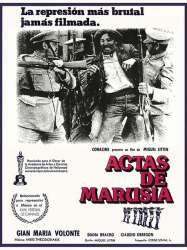
Letters from Marusia (1976)
, 1h50Directed by Miguel Littín
Origin Mexique
Genres Drama, Thriller, Historical
Themes Films about the labor movement, Political films
Actors Gian Maria Volonté, Arturo Beristáin, Diana Bracho, Claudio Obregón, José Carlos Ruiz, Ernesto Gómez Cruz
Roles Original Music Composer
Rating69%






Hell River (1974)
Directed by Stole Janković
Genres Drama, War, Thriller
Themes Politique, Political films
Actors Rod Taylor, Adam West, Bata Živojinović, Olivera Katarina, Peter Carsten, Branko Plesa
Rating54%





Inspirés de faits réels, ce film dépeint la résistance yougoslave] face aux armées d’Hitler.

The Rehearsal (1974)
, 1h32Directed by Jules Dassin
Genres Drama, Documentary, Historical
Actors Jules Dassin, Olympia Dukakis, Laurence Olivier, Stathis Giallelis, Lillian Hellman, Melina Mercouri
Roles Music
Rating68%





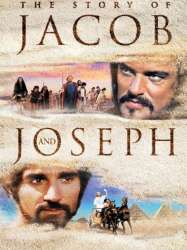 , 2h
, 2hDirected by Michael Cacoyannis
Origin USA
Genres Drama, Historical
Themes Films about religion, Films based on the Bible, Films about Jews and Judaism
Actors Keith Michell, Tony Lo Bianco, Colleen Dewhurst, Herschel Bernardi, Harry Andrews, Julian Glover
Rating64%





This film is the narrative of the Biblical patriarchs, Jacob and his son Joseph. Part I details the story of Jacob fleeing his tribe after cheating his brother Esau out of his birthright, getting cheated himself in his exile years, and learning of the need to make amends. Part II is of the story of Jacob's favourite son, Joseph. Betrayed and sold into slavery by his brothers, he meets and overcomes adversity to become the prime minister of Egypt, closest official to the Pharoah himself.

Serpico (1973)
, 2h5Directed by Sidney Lumet
Origin USA
Genres Drama, Thriller, Biography, Action, Historical, Crime, Politic
Themes La corruption policière
Actors Al Pacino, John Randolph, M. Emmet Walsh, Jack Kehoe, Biff McGuire, Tony Roberts
Roles Music
Rating76%





Working as a uniformed patrolman, Frank Serpico excels at every assignment. He moves on to plainclothes assignments, where he slowly discovers a hidden world of corruption and graft among his own colleagues. After witnessing cops commit violence, take payoffs, and other forms of police corruption, Serpico decides to expose what he has seen, but is harassed and threatened by his peers. His struggle leads to infighting within the police force, problems in his personal relationships, and his life being threatened. Finally, after being shot in the face during a drug bust on February 3, 1971, he testifies before the Knapp Commission, a government inquiry into NYPD police corruption between 1970 and 1972. After receiving a New York City Police Department Medal of Honor and a disability pension, Serpico resigns from the force and moves to Switzerland.

The Battle of Sutjeska (1973)
, 2h8Directed by Stipe Delić
Genres War
Themes Politique, Political films
Actors Richard Burton, Irène Papas, Günter Meisner, Ljuba Tadić, Bata Živojinović, Miroljub Lešo
Roles Music
Rating67%





German-occupied Bosnia and Herzegovina, 1943; under the faithful leadership of Marshal Tito, the Yugoslav Partisans have, for a number of years, put up a staunch fight against the occupying Axis powers. Despite being out-gunned, outmaneuvered and vastly outnumbered, they managed to recuperate in a harsh mountainous region called Durmitor in northern Montenegro. However, their respite is short-lived as the combined foreign and domestic Axis powers begin an encirclement offensive, outnumbering them 6:1. The Partisans have no choice but to fight their way out of the encirclement, then head towards eastern Bosnia. They finally clash with the Axis on the plains of Sutjeska in south-eastern Bosnia.

State of Siege (1972)
, 2h1Directed by Costa-Gavras
Origin France
Genres Drama, Thriller, Crime, Politic
Themes Seafaring films, Politique, Transport films, Political films, Films about Latin American military dictatorships
Actors Yves Montand, Renato Salvatori, O. E. Hasse, Harald Wolff, Maurice Teynac, Jacques Weber
Roles Original Music Composer
Rating76%





À Montevideo, les rebelles d'extrême gauche du Mouvement de libération nationale (Tupamaros) enlèvent Philippe Michael Santore, officiellement fonctionnaire de l'Agence pour le développement international (AID). Alors qu'il se décrit comme un conseiller technique, expert en communication et gestion de la circulation, ses geôliers lui exposent les preuves qu'ils ont recueillies et qui démontrent qu'il agit au nom du gouvernement des États-Unis en tant que conseiller pour la répression et la torture auprès des forces de sécurité de l'Uruguay. L'incapacité de la police et de l'armée à le retrouver menace alors de dégénérer en crise politique.

The Trojan Women (1971)
, 1h45Directed by Michael Cacoyannis
Origin United-kingdom
Genres Drama
Themes Films based on mythology, Théâtre, Films based on Greco-Roman mythology, Political films, Films based on plays, Dans la Grèce mythologique, Films based on Greco-Roman mythology
Actors Katharine Hepburn, Vanessa Redgrave, Geneviève Bujold, Irène Papas, Brian Blessed, Patrick Magee
Roles Original Music Composer
Rating68%





The Trojan Women was one of a trilogy of plays dealing with the suffering created by the Trojan Wars. Hecuba (Katharine Hepburn), Queen of the Trojans and mother of Hector, one of Troy's most fearsome warriors, looks upon the remains of her kingdom; Andromache (Vanessa Redgrave), widow of the slain Hector and mother of his son Astyanax, must raise her son in the war's aftermath; Cassandra (Geneviève Bujold), Hecuba's daughter who has been driven insane by the ravages of war, waits to see if King Agamemnon will drive her into concubinage; Helen of Troy (Irene Papas), waits to see if she will live. But the most awful truth is unknown to them until Talthybius (Brian Blessed), the messenger of the Greek king, comes to the ruined city and tells them that King Agamemnon and his brother Menelaus have decreed that Hector's son Astyanax must die — the last of the male royalty of Troy must be executed to ensure the extinction of the line.

Biribi (1971)
, 1h40Directed by Daniel Moosmann
Origin France
Genres Drama
Actors Bruno Cremer, Georges Géret, Pierre Vaneck, Michel Tureau, Georges Poujouly, Philippe Ogouz
Roles Music
Rating63%





En 1883, orphelin et sans amis, Jean Froissard s'engage dans l'armée française. Ne pouvant supporter la discipline, il est traduit au bout d'une année devant un conseil de guerre. Il est condamné à passer cinq ans dans les bataillons disciplinaires d'Afrique du Nord, que le langage populaire désigne sous le nom de « Biribi ». Là, il doit subir les vexations, injustices et mauvais traitements infligés par les officiers.

Z (1969)
, 2h7Directed by Costa-Gavras
Origin France
Genres Drama, Thriller, Historical, Crime, Politic
Themes Assassinat, Politique, Political films
Actors Jean-Louis Trintignant, Yves Montand, Irène Papas, Jacques Perrin, Charles Denner, François Périer
Roles Original Music Composer
Rating80%





The story begins with the closing moments of a rather dull government lecture and slide show on agricultural policy, after which the leader of the security police of a right-wing military-dominated government (Dux) takes over the podium for an impassioned speech describing the government's program to combat leftism, using the metaphors of "a mildew of the mind", an infiltration of "isms", or "sunspots".
 Connection
Connection



